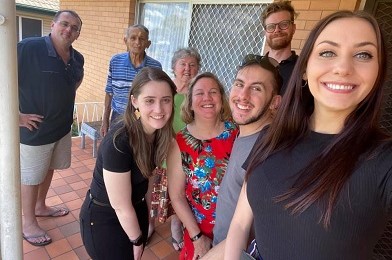Have you ever heard of the sandwich generation? If you are aged in your 40’s or 50’s then you may well be a part of this demographic.
The ‘Sandwich Generation’ refers to the group of people who are currently looking after their own children, but also having to look after their ageing and elderly parents. Very often this group is taking care of everyone else but themselves!
The sandwich generation first came to attention in the 1980s as a group of people faced what were then considered new challenges and extreme stress. Since then, the pressures on this cohort have only increased, due to longer life expectancy and people waiting to have children later in life.
Double Sandwich Anyone?
In fact, the term has grown to include, the double sandwich, where adults are now caring for their grandchildren while their adult children are working, as well as supporting their elderly parents.
It is estimated that there are around 1.5 million middle aged Australians are caught in the sandwich.
Are you Spread too Thin?
Not surprisingly, women are more likely to be in the caring role than men. Many feel that they are being spread too thinly, and finding it difficult to balance the conflicting interests and needs.
Trying to raise and parent children, maintain, or re-establish a career and care for an increasingly needy parent often means that something must give. All too often, it’s important things which contribute to our overall wellbeing, such as sleep, diet, relaxation and exercise.
And it’s not just the time and physical demands, it’s the mental load and guilt that wears many down.
Being a multigenerational caregiver creates financial, logistical, and emotional challenges and there isn’t much in the way of societal support available.
The Surprising Benefits for the Sandwich Generation
But it’s not all doom and gloom, there are benefits to this situation as well:
- This is a unique opportunity to spend more time with family members.
- Stronger intergenerational bonds can develop, bridging the divide that often exists between older and younger generations.
- There is also a chance to model caregiving and set the stage for younger generations, who will inevitably face the same issues in the future.
Preserving your Wellbeing
There may be no formal programs that can be accessed, and the social care infrastructure is decidedly lacking, but there are things that can be implemented to ease the burden:
- Prioritise self-care – Simply put, if you don’t look after yourself then you can’t look after other people. Schedule in activities such as walking, yoga and meditation to keep your mind and body healthy.
- Delegate to other capable adults – Often people feel that they need to do it all but there are usually plenty of other people around who could help. Consider siblings, children (if they are old enough), family friends and other relatives.
- Seek support groups – There are support groups available to provide advice and guidance for caregiving, as well as specific support groups for dealing with Alzheimer’s and other health issues.
- Take advantage of aged care assistance programs – There are a myriad of programs and organisations offering aged care assistance that can be accessed if you take the time to find them. It could be housekeeping, meal preparation, showering assistance or just companionship. While there may be an out of pocket cost, they provide incredible value in freeing up your time and preserving your sanity!
Caring for both your children and your parents at the same time is by no means easy, but there is help available – what’s important is to reach out and find the sources (sauces – geddit?!) that will help keep you fresh!
